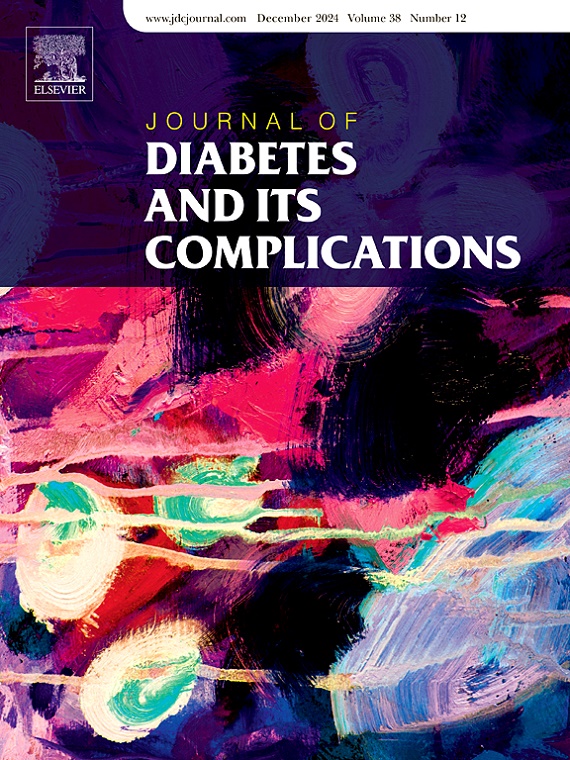A national quality survey of in-patient diabetic foot care calls for centralizing care and improving patient communication
IF 3.1
3区 医学
Q3 ENDOCRINOLOGY & METABOLISM
引用次数: 0
Abstract
Aims
To evaluate the quality of inpatient care for patients with diabetic foot ulcers (DFU) and examine the relationship between managerial awareness of quality indicators and the actual care provided, as documented in the electronic medical records (EMRs).
Methods
A peer-reviewed audit of inpatient DFU care based on interviews with hospital and department management, yielding a comprehensive management score for each hospital; review of electronic medical records (EMR); and patient interviews. Data regarding facilities and personnel were collected as well.
Results
Data was collected from 26 hospitals, 199 EMR and 86 patient interviews. Larger hospital size was correlated with higher comprehensive management scores (p = 0.008). Moreover, large hospitals were more likely to have dedicated DFU cohorts thus simplifying provision of multidisciplinary state-of-the-art care (p = 0.034). Committed managers were more likely to dedicate surgical sessions to DFU patients, mean (±SD) comprehensive management score of 95.9 ± 3.4 in hospitals with dedicated session vs. 79.7 ± 9.6 in those without (p < 0.001). Hospitals with committed management had better documentation and more prevalent use of correct diagnostic codes (r = 0.542), while higher dedication of head nurses of the DFU departments was significantly correlated with higher scores in inpatient care and patient education (r = 0.509, 0.826 respectively). Overall, patient communication and shared decision-making scored relatively low with only 78.8 % of the patients interviewed noting satisfaction.
Conclusions
Large hospitals were more likely to deliver high-quality multidisciplinary care, pivotal to the care of DFU patients. Dedicated management teams strongly impact better delivery of care. Better communication and shared decision-making should be reinforced.
一项全国糖尿病足住院护理质量调查呼吁集中护理和改善患者沟通
目的评价糖尿病足溃疡(DFU)患者的住院护理质量,并检查管理人员对质量指标的认识与电子病历(EMRs)中记录的实际护理之间的关系。方法基于对医院和科室管理人员的访谈,对住院患者DFU护理进行同行评议审计,得出每家医院的综合管理评分;审查电子医疗记录(EMR);和病人面谈。还收集了有关设施和人员的数据。结果收集了26家医院的数据,199份电子病历和86例患者访谈。医院规模越大,综合管理评分越高(p = 0.008)。此外,大医院更有可能有专门的DFU队列,从而简化了多学科最先进护理的提供(p = 0.034)。敬业的管理人员更有可能为DFU患者提供专门的手术时段,有专门手术时段的医院的平均(±SD)综合管理评分为95.9±3.4分,而没有专门手术时段的医院为79.7±9.6分(p <;0.001)。尽职管理的医院有更好的文件记录和更普遍的正确诊断代码的使用(r = 0.542),而DFU科室的护士长越敬业,住院护理和患者教育得分越高(r = 0.509, 0.826)。总体而言,患者沟通和共同决策得分相对较低,只有78.8%的受访患者表示满意。结论大医院更有可能提供高质量的多学科护理,这对DFU患者的护理至关重要。专门的管理团队对更好地提供护理有很大影响。应加强沟通和共同决策。
本文章由计算机程序翻译,如有差异,请以英文原文为准。
求助全文
约1分钟内获得全文
求助全文
来源期刊

Journal of diabetes and its complications
医学-内分泌学与代谢
CiteScore
5.90
自引率
3.30%
发文量
153
审稿时长
16 days
期刊介绍:
Journal of Diabetes and Its Complications (JDC) is a journal for health care practitioners and researchers, that publishes original research about the pathogenesis, diagnosis and management of diabetes mellitus and its complications. JDC also publishes articles on physiological and molecular aspects of glucose homeostasis.
The primary purpose of JDC is to act as a source of information usable by diabetes practitioners and researchers to increase their knowledge about mechanisms of diabetes and complications development, and promote better management of people with diabetes who are at risk for those complications.
Manuscripts submitted to JDC can report any aspect of basic, translational or clinical research as well as epidemiology. Topics can range broadly from early prediabetes to late-stage complicated diabetes. Topics relevant to basic/translational reports include pancreatic islet dysfunction and insulin resistance, altered adipose tissue function in diabetes, altered neuronal control of glucose homeostasis and mechanisms of drug action. Topics relevant to diabetic complications include diabetic retinopathy, neuropathy and nephropathy; peripheral vascular disease and coronary heart disease; gastrointestinal disorders, renal failure and impotence; and hypertension and hyperlipidemia.
 求助内容:
求助内容: 应助结果提醒方式:
应助结果提醒方式:


